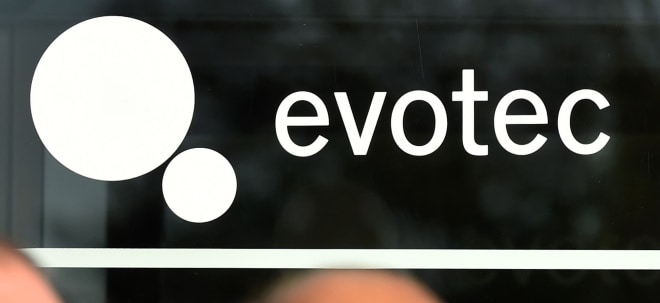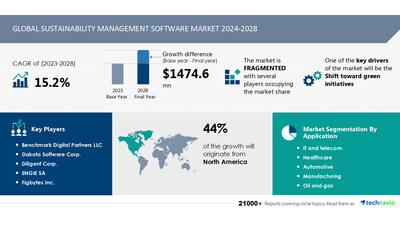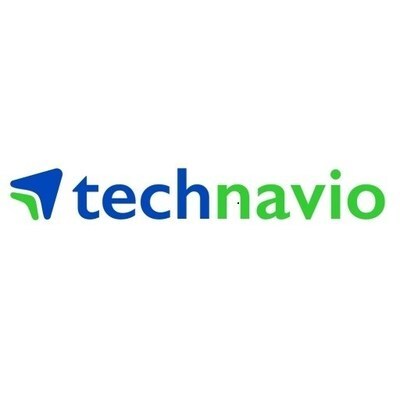Sustainability Management Software Market size is set to grow by USD 1.47 billion from 2024-2028, shift toward green initiatives to boost the revenue- Technavio
NEW YORK, Nov. 25, 2024 /PRNewswire/ -- The global sustainability management software market size is estimated to grow by USD 1.47 billion from 2024-2028, according to Technavio. The market is estimated to grow at a CAGR of 15.2% during the forecast period. Shift toward green initiatives is driving market growth, with a trend towards emergence of analytics in sustainability management software. However, integration issues with erp solutions poses a challenge. Key market players include Benchmark Digital Partners LLC, Dakota Software Corp., Diligent Corp., ENGIE SA, Figbytes Inc., Fortive Corp., International Business Machines Corp., LogicLadder Technologies Pvt. Ltd., Mitsubishi Electric Corp., PDS Group, Quentic GmbH, SAP SE, Schneider Electric SE, Sphera Solutions Inc., UL Solutions Inc., Urjanet Inc., VelocityEHS Holdings Inc., and Wolters Kluwer NV., ICONICS, Inc., HELLA GmbH & Co. KGaA, General Electric Company, Microsoft, Salesforce, Inc.
AI-Powered Market Evolution Insights. Our comprehensive market report ready with the latest trends, growth opportunities, and strategic analysis- View Free Sample Report PDF
Forecast period | 2024-2028 |
Base Year | 2023 |
Historic Data | 2018 - 2022 |
Segment Covered | Application (IT and telecom, Healthcare, Automotive, Manufacturing, and Oil and gas), Deployment (Cloud and On-premises), Vertical/Industry, Software, and Geography (North America, Europe, APAC, South America, and Middle East and Africa) |
Region Covered | North America, Europe, APAC, South America, and Middle East and Africa |
Key companies profiled | Benchmark Digital Partners LLC, Dakota Software Corp., Diligent Corp., ENGIE SA, Figbytes Inc., Fortive Corp., International Business Machines Corp., LogicLadder Technologies Pvt. Ltd., Mitsubishi Electric Corp., PDS Group, Quentic GmbH, SAP SE, Schneider Electric SE, Sphera Solutions Inc., UL Solutions Inc., Urjanet Inc., VelocityEHS Holdings Inc., and Wolters Kluwer NV, ICONICS, Inc., HELLA GmbH & Co. KGaA, General Electric Company, Microsoft, Salesforce, Inc. |
Key Market Trends Fueling Growth
The current business environment is witnessing a decline in energy costs, leading enterprises to adopt smarter methods for managing energy consumption. Energy suppliers impose penalties on inefficient devices with low power factors, and governments worldwide raise the bar for energy standard compliance and carbon footprint reduction. Big data and analytics technologies are playing a significant role in reducing operating expenditures in various industries, including energy and utility, banking, financial and insurance, and healthcare, through predictive modeling techniques. Real-time data analytics helps organizations in the energy sector to comply with regulatory requirements. SaaS-based analytics solutions have gained popularity due to their flexibility. In the solar industry, energy analytics is gaining traction in the global sustainability management software market, utilizing machine learning and predictive analytics technologies. Effective energy management systems integrate predictive analytics with IoT, improving operational efficiency and planning through smart grid initiatives. Real-time analytics optimizes functions such as building-energy management, energy production, weather forecasting, and predictive maintenance of EMS. IoT and predictive analytics provide benefits such as asset efficiency analysis, real-time data collection, optimal warranty period definition, and cost estimation, ultimately optimizing carbon emissions and providing well-informed demand-side operations. These factors will boost the growth of the global sustainability software management market during the forecast period.
Sustainability management software is a business solution that helps companies reduce costs, manage data related to energy usage and resource management, and track their carbon footprint and pollution reduction efforts. This software is trending in various sectors, including manufacturing and chemicals, due to its ability to automate data management, provide real-time information, and support scenario planning for energy savings and climate change mitigation. The software can be implemented as cloud-based, on-premise, or hybrid solutions, offering consulting and implementation services. Key features include project planning, reporting, and collaboration and communication systems. By adopting sustainability management software, businesses can enhance their corporate strategy, embrace sustainable practices, and derisk their supply chains in resource-stressed areas. The software also supports green development, energy efficiency, and the use of renewable resources, ultimately contributing to a low-carbon technology future.
Insights on how AI is driving innovation, efficiency, and market growth- Request Sample!
Market Challenges
- Sustainability management software plays a crucial role in helping businesses manage and reduce their carbon emissions. Integrating this software with an enterprise resource planning (ERP) system can enhance its benefits. However, integration challenges arise due to the complexity of IT infrastructure. The lack of compatibility between sustainability management software and ERP systems can result in additional costs and manual processes. Middleware solutions exist to address some of these issues, but they require customization and can be costly. Overcoming these integration hurdles is essential for the expansion of the global sustainability management software market.
- Sustainability management software is essential for businesses seeking to reduce costs, manage data, and minimize their environmental impact. Challenges include effective energy usage and resource management, data management, and reporting. Automated data management and scenario planning help save energy and reduce carbon footprint, pollution, and climate change risks. The chemicals and manufacturing sectors benefit from sustainability software, enabling supply chain derisking and green development. Corporate strategy and sustainable practices require cloud-based solutions for energy efficiency, carbon emissions reduction, and real-time information on green energy and renewable resources. Implementation and consulting services ensure successful software adoption, whether on-premise, hybrid cloud, or collaboration and communication systems.
Insights into how AI is reshaping industries and driving growth- Download a Sample Report
Segment Overview
This sustainability management software market report extensively covers market segmentation by
- 1.1 IT and telecom
- 1.2 Healthcare
- 1.3 Automotive
- 1.4 Manufacturing
- 1.5 Oil and gas
- 2.1 Cloud
- 2.2 On-premises
- 3.1 North America
- 3.2 Europe
- 3.3 APAC
- 3.4 South America
- 3.5 Middle East and Africa
1.1 IT and telecom- The IT and telecommunications sector is projected to lead the global sustainability management software market due to the significant carbon footprint it contributes to the environment. Currently, ICT is responsible for approximately 3-4% of global CO2 emissions, with telecommunications accounting for 1.6% of this total. Upstream and downstream operations, including energy use from suppliers, contribute up to 90% of telco firms' emissions. With data centers projected to account for 8% of global power consumption by 2030, the need to monitor and reduce carbon emissions is increasingly important. Major telcos have committed to reducing energy usage per unit of traffic by around 70% by the end of this decade, which could potentially reduce emissions by up to 15% by 2030. In response, the ICT industry is adopting sustainability management software to manage emissions and comply with climate regulations, driving market growth within the IT and telecom sector during the forecast period.
Download complimentary Sample Report to gain insights into AI's impact on market dynamics, emerging trends, and future opportunities- including forecast (2024-2028) and historic data (2018 - 2022)
Research Analysis
Sustainability Management Software is a vital tool for businesses seeking to reduce their carbon emissions, manage energy usage, and promote the use of renewable resources. This software enables automated data management of energy consumption and resource usage, providing valuable insights for energy saving and pollution reduction. It also supports scenario planning and project management, helping companies to implement sustainable practices and align with corporate strategy. The software can be delivered through cloud-based, on-premise, or hybrid cloud solutions, offering flexibility to meet various business needs. With great databases and reporting capabilities, this software assists organizations in tracking their carbon footprint, monitoring climate change impacts, and identifying areas for improvement in their manufacturing processes. By adopting Sustainability Management Software, businesses can effectively manage their energy and resources, reduce their environmental impact, and contribute to a more sustainable future.
Market Research Overview
Sustainability management software is a vital tool for businesses seeking to reduce their carbon emissions, manage energy usage, and promote the use of renewable resources. This software enables real-time data management and reporting on energy consumption, resource usage, and environmental impact. It offers automated data management, project planning, scenario planning, and energy-saving strategies to help companies reduce their carbon footprint and pollution levels. The software can be implemented through cloud-based, on-premise, or hybrid cloud solutions, and often includes collaboration and communication systems to facilitate teamwork and information sharing. Sustainability management software is essential for industries such as chemicals and manufacturing, where energy efficiency and resource management are critical. It also plays a crucial role in corporate strategy and the adoption of sustainable practices. Cloud-based solutions offer cost-saving strategies and easy access to low-carbon technology, making them increasingly popular. Overall, sustainability management software is a powerful tool for businesses looking to minimize their environmental impact, improve energy efficiency, and enhance their corporate social responsibility.
Table of Contents:
1 Executive Summary
2 Market Landscape
3 Market Sizing
4 Historic Market Size
5 Five Forces Analysis
6 Market Segmentation
- Application
- IT And Telecom
- Healthcare
- Automotive
- Manufacturing
- Oil And Gas
- Deployment
- Cloud
- On-premises
- Vertical/Industry
- Software
- Geography
- North America
- Europe
- APAC
- South America
- Middle East And Africa
7 Customer Landscape
8 Geographic Landscape
9 Drivers, Challenges, and Trends
10 Company Landscape
11 Company Analysis
12 Appendix
About Technavio
Technavio is a leading global technology research and advisory company. Their research and analysis focuses on emerging market trends and provides actionable insights to help businesses identify market opportunities and develop effective strategies to optimize their market positions.
With over 500 specialized analysts, Technavio's report library consists of more than 17,000 reports and counting, covering 800 technologies, spanning across 50 countries. Their client base consists of enterprises of all sizes, including more than 100 Fortune 500 companies. This growing client base relies on Technavio's comprehensive coverage, extensive research, and actionable market insights to identify opportunities in existing and potential markets and assess their competitive positions within changing market scenarios.
Contacts
Technavio Research
Jesse Maida
Media & Marketing Executive
US: +1 844 364 1100
UK: +44 203 893 3200
Email: media@technavio.com
Website: www.technavio.com/
![]() View original content to download multimedia:https://www.prnewswire.com/news-releases/sustainability-management-software-market-size-is-set-to-grow-by-usd-1-47-billion-from-2024-2028--shift-toward-green-initiatives-to-boost-the-revenue--technavio-302314987.html
View original content to download multimedia:https://www.prnewswire.com/news-releases/sustainability-management-software-market-size-is-set-to-grow-by-usd-1-47-billion-from-2024-2028--shift-toward-green-initiatives-to-boost-the-revenue--technavio-302314987.html
SOURCE Technavio



